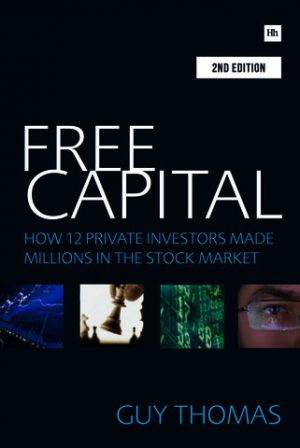
Andrew Howe is intrigued by Guy Thomas's analysis of the investment approaches of 12 millionaires.
Free Capital, written by actuary and investor Guy Thomas, describes the backgrounds and circumstances of
12 relatively low profile full-time private investors. The 12 millionaire investors ? all of whom are male ? boast enviable investment track records. All but one of the investors specialises in smaller companies. Of course, the author targeted such people ? there is no corresponding analysis of unsuccessful investors.
The investors have different backgrounds, qualifications, skills and personalities. The move from conventional employment to full-time investment was not always entirely voluntary ?
several faced challenges in terms of illness, disability or redundancy. The book does a good job in comparing how this impacted the paths the investors took.
Both author and most interviewees readily admit the role that luck can play in achieving excellent investment returns. For several investors, the early years were often not great ? one forms the impression they were effectively paying to develop investment skill ? but several of the investors benefited early on from ?10-baggers? (stocks that rise by 10 times the purchase price or more).
Each chapter contains an interview with an investor, interspersed with the author?s observations, and ends with a summary headed ?Insights and Advice?. The summary provides a brief reminder of the investor?s approach ? the book is worth buying for these alone.
Many of the investors share common traits, including a desire to work things through themselves and valuing wealth more for freedom than prestige ? none want to return to being ?wage slaves?.
I was particularly struck by the investors? ability to explain their investment approach, relating it to their skills. They know their competitive advantage and tend not to stray from their favoured ground. Failing this, it is all too easy to move from being a ?value investor? to favouring a ?momentum? approach, buying high and selling low.
Free Capital is excellent storytelling but, more importantly, covers material that you will struggle to find elsewhere. There are many deeper aspects that also make Free Capital noteworthy.
One example is the idea of holding a variety of smaller companies more for liquidity than diversification. Another example is the Kelly criterion, which will be known to some.
Free Capital prompted me to delve
deeper regarding potential asset allocation applications.
I suspect that Guy Thomas has much more he could tell us. Two articles ? ?Diamonds and flower bulbs? and
?How many shares should an investor hold?? from his blog give a fascinating insight into the author?s approach.
From a personal perspective, I would have appreciated more on the mechanics of investing in smaller companies ?
bid-offer management, for example.
To be fair, this was never the author?s aim ? the introduction clearly states that
Free Capital is not a ?how to? book. Even so, there are plenty of exploitable concepts for those with the stomach for the work. This applies to the technical ideas ? Kelly, and so on ? and some more obviously practical elements.
?Vernon? uses a three-tier framework when considering whether to buy ? a core thesis, secondary factors and hygiene factors ? illustrated by a
real investment. Another example is that ?Bill? uses a ?value spider?, which takes into account 16 metrics. With those hints we might try to mimic those investors and work the rest out for ourselves.
My recommendation is that if this thought-provoking book is not worth £10 or so of your money, then I don?t know what is. All author royalties go to charity, so join me in making 2012 the year you finally get your investments ? and your investment strategy ? into shape.